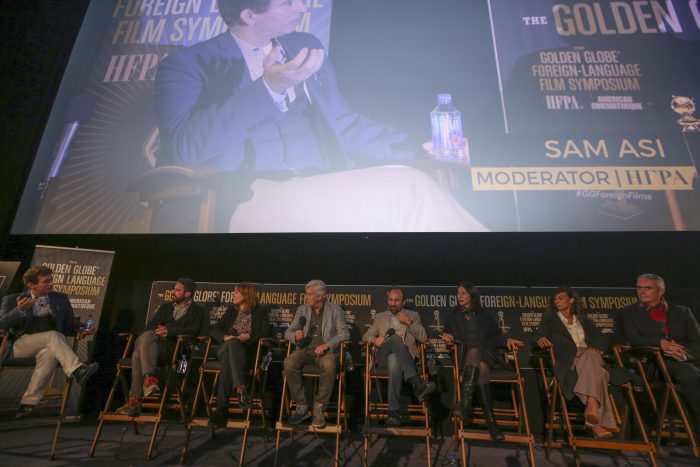
When the Academy of Motion Pictures Arts and Sciences released its 5 Oscar nominees in the Foreign Language Film category, no one was surprised by the absence of The People’s Republic of China’s submission, Huo Jianqi’s Xuanzang, which depicts the legendary seventh-century spiritual journey of Buddhist monk Xuanzang from China to India. Since its selection by China’s State Administration of Press, Publication, Radio, Film and Television (SAPPRFT) to represent its country at the Oscar competition, the film was deemed by commentators as unfit to fight the awards battle. It has neither won any festival awards, nor received critical acclaim, nor made any impact at the box office. So no wonder that it was completely ignored by the press and failed to gain any attention during the award season.
Interestingly, there wasn’t a promotion campaign for Xuanzang, and it was not even submitted for Golden Globes consideration. Submitting an Oscar contender to The Hollywood Foreign Press association (HFPA) for Golden Globes consideration endows it with more exposure and consequently enhances its recognition chances in the Oscar race. But it seems that even the Chinese authorities didn’t believe that it had a chance, and hence didn’t bother spending money on a promotion campaign.
Luckily, unlike the Academy of Motion Pictures Arts and Sciences, which accepts submission for an Oscar consideration in the Foreign-Language film category only from the producing country’s governmental entities, the HFPA allows any filmmaker, from all nationalities, to submit his/her film independently for a Golden Globe consideration in the same category, as long as 51% of the spoken language in the film is not English. This has enabled other Chinese filmmakers, whose films were not selected to represent their country at the Oscars, to enter the Golden Globes race.
This fall, three Chinese movies from iconic directors were submitted for a Golden Globes consideration, but I had the chance to see only two: Wu Tianming’s “Song of the The Phoenix,”and Feng Xiangang’s “I Am Not Madame Bovary.” None of them was able to secure a nomination. The question is: are they artistically unaccomplished or do they lack something else?
“Song of the Phoenix,” tells the story of a musician whose dream to form a suona troup is thwarted by the modernization and urbanization of the new China that no longer values traditional music. But in spite of its interesting subject matter and the respect its director commands around the world -Martin Scorsese volunteered to introduce its screening out of respect for Wu- the film had no chance in the awards race. It was made three years ago, and garnered little attention from the press or critics. In fact, I was the only Golden Globe voter, who attended its screening. So sadly, it didn’t register in the consciousness of the voters.
“I am Not Madame Bovary,” however, was a different story. Other than having been directed by the iconic Feng Xiaogang and starring a megastar Fan Bingbing, it has collected some venerable accolades, such as the Golden Seashell for best film and best actress for Fan at the San Sebastian Film Festival, FIPRESCI prize at Toronto International Film Festival and the Golden Horse Award for best director for Feng, and was hailed by international critics, scoring an impressive 88% on the American reviews aggregator website, Rotten Tomatoes.
Feng ingeniously employs comedy and uses different shapes of framing in “I am Not Madame Bovary” to offer an intriguing social commentary through the eyes of a cafe proprietor (Fan Binbing) who causes political storm when she petitions the legal system after she is swindled by her ex-husband. Fan captivates and charms as she leads us on a harrowing emotional journey of a woman, who fearlessly and persistently confronts a rigid political system for over a decade. Given Hollywood’s healthy appetite nowadays for female centric stories and political themes, “I am Not Madame Bovary” sounded like a perfect pitch for the awards. Then why did it fail to make an impression?
Before we jump to any conclusions, let’s examine the other films that have received Golden Globes nominations in the best foreign Language film category: “Elle,” from France, “The Salesman,” from Iran, “Neruda” from Chile, “Toni Erdmann” from Germany and “Divines” from France.
Like “I am Not Madame Bovary”, all these movies are underpinned by compelling stories and anchored by strong characters and explore complex political and social issues. Elle tells the story of a business woman who forms a sexual relationship with her rapist. “The Salesman” follows a teacher hunting down an intruder who assaulted his wife. “Neruda,” revolved around the celebrated Chilean poet when he was he chased by his government for his communist convictions in 1948. “Toni Erdmann” centers on a business consultant struggling to bond with her eccentric father while dealing with her sexist work colleagues. And “Divines” tells the story of a teenage drug pusher in a Parisian ghetto who dreams of great fortune.
They all have won numerous prestigious accolades and gained critical acclaim. It happened that all of them received their premiere at the Cannes International Film Festival, and some of them left with valuable prizes. They followed with screenings in other festivals, where they collected more trophies.
Three of these movies, Elle, The Salesman and Neruda were made by internationally renowned directors: The Dutch Hollywood veteran Paul Verhoeven, Iranian Oscar-winner Asghar Farhadi and Chilean Auteur Pablo Larrain respectively. Elle and Neruda also benefited from having international stars in their lead roles, French Isabelle Huppert and Mexican Gael Garcia Bernal respectively.
Judging from the above, “I am Not Madame Bovary” could fit in easily among these movies. In fact, it’s comparable to the Golden Globe winner, Elle, namely it has a named director, International star in the lead, intriguing story with social commentary and critically acclaimed. So where did “I am Not Madam Bovary” fail?
All the nominated movies were represented by Hollywood’s best publicists, who know exactly how to target voters and how to promote their movies to them. “Divines,” for instance, is a small movie made by an unknown first time director with unknown actors. It wouldn’t have a chance of a nomination had it not been represented by one of the hottest publicists in town. The same publicist represented La La Land, which scooped 7 Golden Globes, and Moonlight, which took the Golden Globe for Best Drama, and Fences, which snatched the Golden Globe for Best Actress in a Drama for Viola Davis. When such a publicist backs a movie, a Golden Globe nomination is almost certain.
The others had other tricks up their sleeves. When you have luminous stars in your movie, they shine a light on your path to awards glory. And the publicists know how to exploit that. Elle’s director Verhoeven and its actress Huppert held press conferences for the Golden Globe voters, and attended their parties, enchanting them with their charming personas. The Salesman’s Farhadi attended the Golden Globes screening of his movie and hosted a dinner at an exclusive Beverly Hills restaurant for the voters, who had the chance to connect with him on a personal level. Neruda’s director Larain and its star Bernal also spent time with the voters at a press conference and at a couple of parties.
To further demonstrate the impact of a star’s presence at award screenings, I’ll offer Xavier Dolan “It’s Only the End of the World” as an example. This Canadian film was derided by the critics, and described by some as one of the worst movies of 2016 when it was premiered at Cannes International Film Festival in May. Yet, it managed to sneak into the Academy’s short list of the Foreign language movies. I happened to be at that screening, which was followed by a reception at an exclusive Beverly Hills restaurant hosted by none other than its glamorous star, Oscar-winning Marion Cotillard. The Oscar voters were enchanted by her elegance and charm, and rewarded her accordingly.
As for “I Am Not Madame Bovary,” it didn’t even have a publicist. And if it did, I haven’t heard of them. I was invited to its premiere by The 3rd China Onscreen Biennial and Well Go USA Entertainment, rather than to an exclusive voters screening, at an LA museum. The place was packed with patrons, but very few Golden Globes voters. Thereafter, I don’t recall hearing any of my colleagues mentioning it. It quickly drifted into indifference and oblivion.
Now compare that to the 2012 awards campaign of Zhang Yimou’s “The Flowers of War,” which ultimately scored a Golden Globes nomination, although it was critically derided, achieving only 42% approval on Rotten Tomato, and hadn’t won any notable awards. Unlike “I Am Not Madame Bovary,” however, “The Flowers of War” was represented by one of Hollywood’s top award publicists (This year, he represented Golden Globe winner, Zootopia). Zhang, and his actors Christian Bale and Ni Ni, hosted two parties, one at a luxury hotel and another at an exclusive restaurant in Beverly Hills, for the Golden Globe voters, who also received traditional Chinese gifts with a charming letter from Zhang himself.
The bottom line is that it’s easier to make a great movie than to promote it. Many of the Foreign movies submitted for Golden Globe and Oscar nominations are highly accomplished and worthy of the highest honors, but only those who rose above the foray and loudly announced their presence to the world were noticed and recognised.
